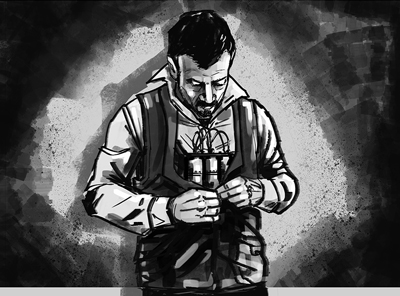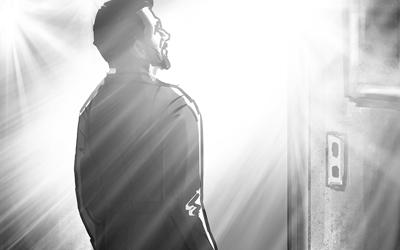There are things in the Bible that even dedicated Christians have possibly never read. One thing like that is the somewhat strange story of the time in King David’s life when his son, Absalom, led a rebellion against his father which was very nearly successful. And actually this rebellion was allowed or brought on by God Himself as a chastening judgment on David for his sins.

David & Ahitolphel
To me, one of the most amazing parts of this story is when David is with the few friends who stuck with him as they prepare to quickly flee Jerusalem. The forces who turned against David and allied themselves with Absalom were out to destroy the king.
We find that David had a councilor or adviser named Ahithophel who was perhaps David’s top consultant to his reign and kingdom. And the Bible says of Ahithophel, “The counsel of Ahithophel, which he counseled in those days, was as if a man had inquired at the oracle of God.” (II Samuel 16:23) That’s a very unusual Bible verse but basically it means that the counsel of Ahithophel was virtually flawless and perfect, almost supernatural so.
And yet…, something was wrong. This man’s incredible gift somehow didn’t prevent him from taking the side of King David’s mortal enemy, his own conniving, ambitious son Absalom. Nevertheless, of all that was going on, it seems David feared the council of Ahithophel as he worked together with Absalom more than anything else. When David heard that Ahithophel was advising Absalom, David prayed, “O Lord, I pray thee, turn the counsel of Ahithophel into foolishness.” (II Samuel 15:31)

Fleeing Jerusalem, David sends Hushai back
As they fled east from Jerusalem, David sent back one of his most loyal subjects and advisers, Hushai, to feign obedience to the usurper, Absalom. Absalom gathered his councilors and sages, including Ahitolphel and Hushai, and Absalom asked Ahitolphel what he counseled.
Basically Ahitolphel said they should go after David and his bands immediately. And probably if they’d done that, it would have been successful. Absalom then turned to Hushai, knowing that he’d been in the inner circle of David’s friends and asked what he thought they should do.

Absalom
What a moment that must have been. What an incredible movie this would make. Did Hushai blurt out that Ahitolphel’s council was totally wrong, as he tried to save King David? No; no one would have believed that. So Hushai said, “The council of Ahithophel is not good at this time,” (II Samuel 17:7) and went on to try to explain how the best would be for them to wait till they had gathered a really big army and to take on David’s smaller forces in open field combat. Of course this was because Hushai knew that David and his men were very weak and on the run at the moment and if Absalom followed Ahithophel’s council, they would actually defeat and kill King David and his men.
Another incredible moment. Absalom’s response? “The council of Hushai is better than the council of Ahithophel.” (II Samuel 17:14) Actually it wasn’t. But the Lord had answered David’s prayer to defeat the council of Ahitophel. This delay gave time for David and his men to regroup and strengthen themselves.
To me, one of the most amazing parts of this story is what it says happened next. II Samuel 17:23 says, “And when Ahithophel saw that his counsel was not followed, he saddled his ass, and arose, and gat him home to his house, to his city, and put his household in order, and hanged himself, and died, and was buried in the sepulcher of his father.”
Was he defeated in battle? Did he wait to see what would happen next? Nope. Ahithophel evidently had enough presence of mind that he knew in advance that the cause of Absalom was now lost and that the rebel’s side, that he had joined with, was doomed. So he just went home and committed suicide.

Absalom rides to his death in battle against King David
And as it turned out, Ahithophel was right again: the rebels’ cause was already lost. Absalom and his troops were defeated in open battle with David’s fewer but more seasoned warriors.
There’s just so much to all this that my normal length of these posts doesn’t suffice to cover it all. Ahithophel’s virtual godlike gifts didn’t prevent him from making a fatal mistake of disloyalty to God’s anointed king. Was it ambition? Familiarity? Spiritual pride? Evidently something was seriously wrong with the condition of his heart, despite his incredible gifts and evident intelligence.
I can’t know for sure but I’ve always felt this passage in the Psalms is where David talked about his relationship with Ahitophel. “For it was not an enemy that reproached me; then I could have borne it: neither was it he that hated me that did magnify himself against me; then I would have hid myself from him: But it was thou, a man mine equal, my guide, and mine acquaintance. We took sweet counsel together, and walked unto the house of God in company.” (Psalm 55:12-14) Later in the same Psalm David says, “”The words of his mouth were smoother than butter, but war was in his heart: his words were softer than oil, yet were they drawn swords.” (Psalm 55:21)
It’s all a massive story with layers of meaning and lessons for us all. One of the clearest for me is what Solomon, David’s son and eventual heir, wrote years later, “Keep your heart with all diligence for out of it are the issues of life.” (Proverbs 4:23)
It’s all about your heart, not your gifts, not your intelligence, not your looks or anything other than your personal relationship with the Lord and how you conduct your life before Him. Ahitophel must have been one of the wisest men that ever lived. But his wisdom didn’t prevent his heart from making the biggest mistake of his life, which ultimately cost him his life. May God help us all to keep our heart right with Him.
 Last month I had an interesting conversation with a young lady around 12 years old. She’s full of faith and, in some ways, wise beyond her years. And I felt inspired to tell her (thinking about how things can go between the ages of 13 and 21) that it’s a little like she’s in a harbor right now. But soon she’ll move out into the full ocean where the waves are stronger and the shore further away.
Last month I had an interesting conversation with a young lady around 12 years old. She’s full of faith and, in some ways, wise beyond her years. And I felt inspired to tell her (thinking about how things can go between the ages of 13 and 21) that it’s a little like she’s in a harbor right now. But soon she’ll move out into the full ocean where the waves are stronger and the shore further away. Then last night, after I was already down for the night and nearly asleep, a poem was coming to me about her and about how others like her are at that poignant point in their lives, on the cusp of… not adulthood but whatever that change is that is so marked as we enter into our teen years.
Then last night, after I was already down for the night and nearly asleep, a poem was coming to me about her and about how others like her are at that poignant point in their lives, on the cusp of… not adulthood but whatever that change is that is so marked as we enter into our teen years.



 “
“ much you feel you need to get further involved. They’re a “tar baby”.
much you feel you need to get further involved. They’re a “tar baby”.


























